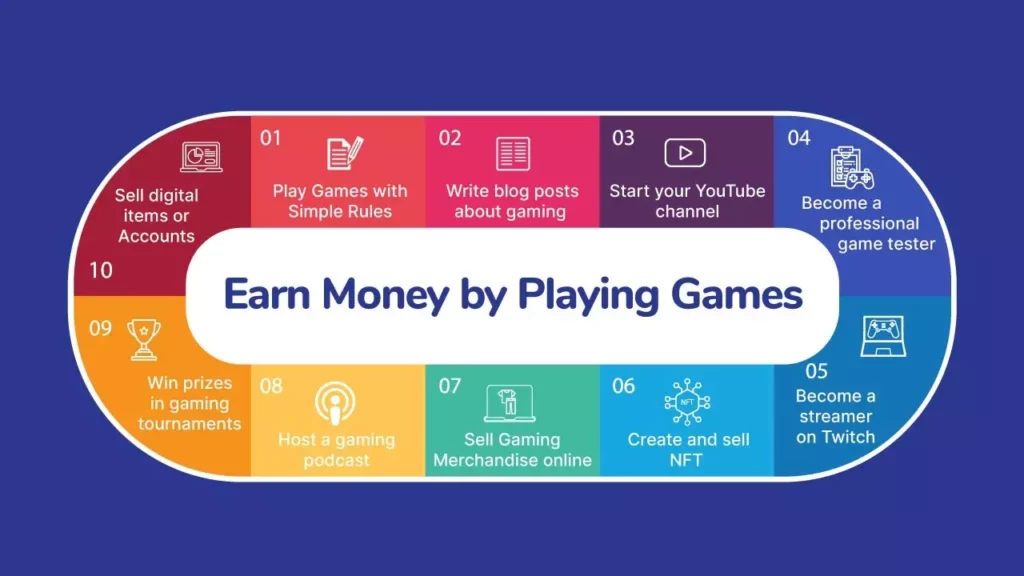Why Play-to-Earn Games Are the Future of Online Amusement
The development of play-to-earn video games is improving the online home entertainment landscape by incorporating financial motivations that permit players to monetize their engagement in immersive virtual atmospheres. This design, underpinned by blockchain innovation, not just boosts gamer satisfaction with concrete benefits however likewise promotes a feeling of neighborhood and possession. As standard pc gaming standards are tested, the effects for both programmers and customers are extensive, questioning concerning the future characteristics of the pc gaming sector and its possible to redefine enjoyment as we understand it. What does this mean for the following generation of players and designers?
The Increase of Play-to-Earn Versions
In the last few years, the concept of play-to-earn versions has gained substantial traction, transforming the landscape of on the internet home entertainment. This innovative technique enables gamers to produce real-world income with their participation in pc gaming environments. Unlike traditional pc gaming designs that largely focus on entertainment and consumerism, play-to-earn video games incorporate blockchain modern technology to allow gamers to make copyright or electronic possessions that hold inherent value.
The surge of these models can be credited to several variables, including innovations in technology, the raising acceptance of cryptocurrencies, and an expanding need among players for more gratifying experiences. Gamers are no longer just easy consumers; they are active individuals who can monetize their skills and time (play to earn games). This change has produced brand-new chances for video game designers to craft immersive experiences that incentivize involvement and creativity
Additionally, the international pandemic has accelerated the passion in on-line pc gaming as a viable income, more solidifying the appeal of play-to-earn structures. Consequently, a diverse range of video games throughout numerous genres is emerging, each offering distinct auto mechanics and incentives. The play-to-earn version is positioned to redefine the gaming industry, promoting a community-focused atmosphere where gamers can prosper both socially and monetarily.
Financial Motivations for Gamers
Gaining substantial incentives has actually come to be a significant driving pressure behind the appeal of play-to-earn video games, bring in a varied gamer base anxious to exploit on their gaming skills. Unlike traditional gaming models, where players invest effort and time without financial return, play-to-earn games offer a distinct economic framework that permits players to monetize their gameplay.
In these environments, players can gain cryptocurrencies, non-fungible symbols (NFTs), or in-game properties that can be traded or offered on different markets. This direct economic incentive not only enhances player engagement yet additionally promotes a feeling of ownership over their digital properties. Gamers are encouraged to spend more time and energy right into gameplay as their abilities equate into real-world worth.

Area Involvement and Development
A vivid area is essential for the success and longevity of play-to-earn games, as it cultivates cooperation, expertise sharing, and gamer retention. Energetic interaction amongst gamers improves the video gaming experience, motivating them to develop partnerships, share strategies, and join discussions. This collective participation not only nurtures Read More Here a feeling of belonging however likewise drives players to spend even more time and resources into the game.
In addition, areas frequently become centers for content creation, with players creating tutorials, fan art, and gameplay video clips. Such contributions enhance the game's exposure and bring in brand-new gamers, thus helping with organic growth. Designers can take advantage of community responses to refine gameplay technicians and address worries, making players feel valued and invested in the game's evolution.
Moreover, community-driven events, such as competitions and collaborative objectives, provide chances for players to showcase their abilities and earn benefits, reinforcing their commitment to the video game. As players develop much deeper connections with each other, loyalty to the game raises, establishing a lasting ecosystem that profits both designers and players. Therefore, area engagement is not simply an accessory however a keystone for the flourishing future of play-to-earn video games.
Assimilation of Blockchain Innovation
The assimilation of blockchain technology is changing just how play-to-earn video games run, improving both gamer experience and financial practicality. By making use of decentralized ledgers, blockchain makes sure that in-game assets are firmly possessed by gamers, enabling real ownership of digital things. This contrasts sharply with typical video gaming versions, where players invest money and time without retaining any insurance claim to their in-game success.
Smart agreements, a crucial component of blockchain, automate deals and enforce game rules transparently. This reduces the risk of fraudulence and boosts depend on in between programmers and gamers. Players can trade, market, or rent their digital assets in secondary markets, developing real-world financial chances that were previously unattainable in standard pc gaming atmospheres.
Moreover, blockchain modern technology promotes a lively environment where designers can incentivize gamer Make money online gaming participation via token rewards. This cutting-edge economic version empowers players, straightening their interests with game programmers, and ultimately leading to more interesting and lasting pc gaming experiences.
Future Fads in Gaming Market
Quick advancements in innovation are positioned to improve the pc gaming industry in the coming years, with a number of crucial fads becoming frontrunners. One popular pattern is the increase of immersive modern technologies, such as virtual reality (VR) and enhanced truth (AR), which are readied to redefine gamer experiences by developing more interactive and appealing atmospheres. As equipment capacities boost and costs decrease, these technologies will end up being much more easily accessible to a more comprehensive target market.

Additionally, the play-to-earn version is expected to get grip, empowering players to monetize their video gaming abilities and time. This standard shift will not just bring in a brand-new demographic of gamers however additionally cultivate a more sustainable video gaming ecological community. Collectively, these trends represent a transformative age for the pc gaming sector, where modern technology and gamer involvement converge to create unrivaled enjoyment experiences.

Verdict
Play-to-earn video games are poised to reinvent online enjoyment by fostering financial incentives that improve player interaction and ownership. The assimilation of blockchain technology not just promotes the monetization of pc gaming experiences but likewise grows vivid neighborhoods. As the pc gaming landscape continues to develop, the focus on energetic participation and economic incentives will likely drive further advancement, strengthening the role of play-to-earn designs as a substantial pressure in the future of the video gaming market.
Unlike typical gaming models that mainly concentrate on amusement and consumerism, play-to-earn video games incorporate blockchain technology to allow players to make copyright or electronic properties that hold inherent worth.
The play-to-earn model is poised to redefine the gaming market, promoting a community-focused atmosphere where gamers can grow both socially and financially. play to earn games.
As players develop deeper connections with one another, loyalty to the game enhances, developing a lasting ecosystem that benefits both players and developers.Moreover, the play-to-earn model is expected to gain grip, encouraging gamers to monetize their video gaming skills and time. Collectively, these trends signify a transformative era for the gaming sector, where modern technology and gamer interaction converge to create unequaled entertainment experiences.